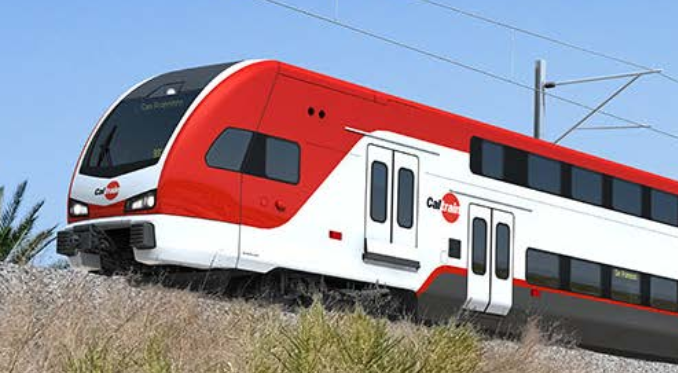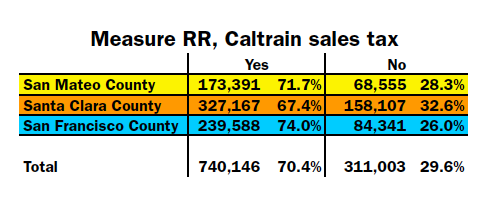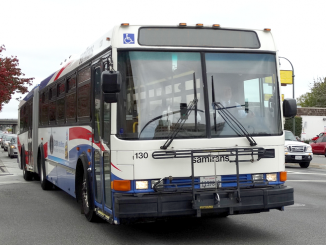
Caltrain will get a $108 million annual boost to its budget now that voters have approved Measure RR, a sales tax for the commuter railroad. Promoters spent more than $2 million promoting the measure with mailers, TV commercials and other advertising.
Caltrain officials had threatened to shut down if voters didn’t approve the one-eighth-of-a-cent sales tax.
Measure RR, which required a two-thirds vote from three Bay Area counties, got 70.4% of the vote, or 39,381 more votes than it needed to pass.
 “With the passage of Measure RR, Caltrain now has for the first time in its nearly 30-year history a reliable and dedicated funding source,” said San Mateo County Supervisor Dave Pine, who also serves as the chairman of the Peninsula Corridor Joint Powers Board that oversees Caltrain.
“With the passage of Measure RR, Caltrain now has for the first time in its nearly 30-year history a reliable and dedicated funding source,” said San Mateo County Supervisor Dave Pine, who also serves as the chairman of the Peninsula Corridor Joint Powers Board that oversees Caltrain.
Pine lent $500,000 of his own money to the Measure RR campaign to pass the measure. Because it’s a loan, he’ll get the money back when the campaign gets donations after the election.
In all, supporters of Measure RR spent $2 million to promote the tax. Contributors included Google, Uber, Lyft, Facebook, Greystar Real Estate, SalesForce, the 49ers and the Warriors among others.
The measure would implement an eighth-cent sales tax increase in the three counties that would raise an estimated $108 million every year for 30 years. Caltrain depends on fares for nearly 70% of its revenue and lost up to 95% of its ridership during the Covid lockdown order — created an $18.5 million budget deficit.
However, Caltrain didn’t layoff any of its employees during the pandemic like other employers did, which caused its budget deficit to grow.
“Measure RR funds will allow Caltrain to weather the Covid pandemic with continued service and provide faster, more frequent, and affordable service in the future,” Pine said.
The tax was originally envisioned as a way to replace the $20 million to $30 million Caltrain gets each year from the transit agencies in the three counties. However, the $108 million will far exceed what it would cost to replace the money from the counties.
However, electrification will increase Caltrain’s costs and the railroad’s board has been talking about offering low-income riders half-priced fares.
Measure RR will increase the sales tax in Santa Clara County from 9% to 9.125%. In San Mateo County, it will go from 9.25% to 9.375% in most cities. In San Francisco, the sales tax will increase from 8.5% to 8.375%.
Critics of Measure RR said that sales taxes create a larger burden on the poor because a higher percentage of their income goes to buying items subject to the sales tax compared to the well-to-do.
But funding transit improvements with sales taxes keeps the burden off of the large employers in the area, who rely on Caltrain, BART and VTA to get their workers to their jobs. Local politicians have avoided taxing tech companies for transportation projects. — From staff and wire reports




They’ll be back for more taxes. This will only encourage them. A parcel tax for grade separations? Sure. We’re talking several billion dollars they’ll want to squeeze out of residents for a railroad that only carries 30,000 people a day at its height.
Len,do your research.. more like double that amount of people per day pre-covid. But wait till the 60,000 start driving daily,the we got la traffic